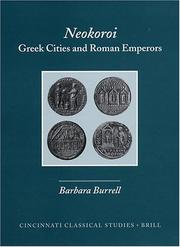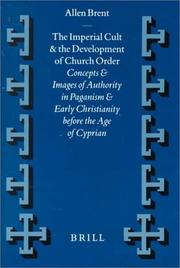| Listing 1 - 10 of 11 | << page >> |
Sort by
|
Book
ISBN: 3519074443 9783519074441 Year: 1999 Publisher: Stuttgart Teubner
Abstract | Keywords | Export | Availability | Bookmark
 Loading...
Loading...Choose an application
- Reference Manager
- EndNote
- RefWorks (Direct export to RefWorks)
Emperor worship --- Emperors --- Rome --- History. --- Religion. --- Emperor worship - Rome. --- Emperors - Rome.

ISBN: 0198152752 0199275483 9780198152750 9780199275489 Year: 2002 Publisher: Oxford [etc.] : Oxford University Press,
Abstract | Keywords | Export | Availability | Bookmark
 Loading...
Loading...Choose an application
- Reference Manager
- EndNote
- RefWorks (Direct export to RefWorks)
Emperor worship --- 292.07 --- Emperor worship, Roman --- Religion Classical Roman --- Rome --- Religion. --- Culte impérial --- Herrscherkult. --- İmparatora tapma --- Roma --- Römisches Reich. --- Din. --- Culte impérial --- Religion --- Emperor worship - Rome

ISBN: 3534060784 9783534060788 Year: 1978 Volume: 372 Publisher: Darmstadt Wissenschaftliche Buchgesellschaft
Abstract | Keywords | Export | Availability | Bookmark
 Loading...
Loading...Choose an application
- Reference Manager
- EndNote
- RefWorks (Direct export to RefWorks)
Comparative religion --- Emperor worship --- Culte impérial --- #BIBC:bibl.Reekmans --- 292.2 --- 292.2 Godsdiensten van de Romeinen --- Godsdiensten van de Romeinen --- Emperor worship, Roman --- Culte impérial --- Emperor worship - Rome
Book
ISBN: 9004398368 9004398376 9789004398368 9789004398375 Year: 2019 Publisher: Leiden : Brill,
Abstract | Keywords | Export | Availability | Bookmark
 Loading...
Loading...Choose an application
- Reference Manager
- EndNote
- RefWorks (Direct export to RefWorks)
As political power in Rome became centered on the emperor and his family, a system of honors and titles developed as one way to negotiate this new power dynamic. Classified under the modern collective heading ?imperial cult? (or emperor worship or ruler cult), this system of worship comprises religious rituals as well as political, economic, and social aspects. In this article, Gwynaeth McIntyre surveys the range of ancient literary sources and modern scholarly debates on how individuals became gods in the Roman world. Beginning with the development of exceptional honors granted to Julius Caesar and his deification, she traces the development of honors, symbols, and religious rituals associated with the worship of imperial family members. She uses case studies to illustrate how cult practices, temples, and priesthoods were established, highlighting the careful negotiation required between the emperor, imperial family, Senate, and populace in order to make mortals into gods.
Emperor worship --- Emperor worship, Roman --- Rome --- Rim --- Roman Empire --- Roman Republic (510-30 B.C.) --- Romi (Empire) --- Byzantine Empire --- Rome (Italy) --- Kings and rulers --- Religious aspects. --- Influence. --- Religion. --- E-books --- Emperor worship - Rome
Book
ISBN: 9780472130054 0472130056 9780472122189 0472122185 Year: 2016 Publisher: Ann Arbor : University of Michigan Press,
Abstract | Keywords | Export | Availability | Bookmark
 Loading...
Loading...Choose an application
- Reference Manager
- EndNote
- RefWorks (Direct export to RefWorks)
Roman politics and religion were inherently linked as the Romansattempted to explain the world and their place within it. As Roman territory expanded and power became consolidated into the hands of oneman, people throughout the empire sought to define their relationship with the emperor by granting honors to him. This collection of practices has been labeled "emperor worship" or "ruler cult," but this tells only half the story: imperial family members also became an important partof this construction of power and almost half of the individuals deified in Rome were wives, sisters, children, and other family members of the emperor. "A Family of Gods" seeks to expand current "ruler cult" discussions by including other deified individuals, and by looking at how communities in the period 44 BCE to 337 CE sought to connect themselves with the imperial power structure through establishing priesthoods and cult practices. It focuses on the priests dedicated to the worship of the imperial family in order to contextualize their role in how imperial power was perceived in the provincial communities and the ways in which communities chose to employ religious practices.
Emperor worship --- Rome --- Kings and rulers --- Religious aspects --- Influence --- Religion --- Emperor worship. --- Religion. --- Familie. --- Herrscherkult. --- Influence. --- Religious aspects. --- Kaiser, ... --- Rome (Empire). --- Römisches Reich --- Westprovinzen. --- E-books --- Rome (Empire) --- Emperor worship - Rome --- Rome - Kings and rulers - Religious aspects --- Rome - Kings and rulers - Influence --- Rome - Religion

ISBN: 9004125787 9786610466740 1423711920 128046674X 9047401506 9789004125780 9781423711926 9789047401506 9781280466748 6610466742 Year: 2004 Volume: new ser.,9 Publisher: Leiden Boston Brill
Abstract | Keywords | Export | Availability | Bookmark
 Loading...
Loading...Choose an application
- Reference Manager
- EndNote
- RefWorks (Direct export to RefWorks)
The neokoroi, or ""temple-wardens"", were Hellenized cities of the eastern Roman Empire who received that title for possessing their provinces' temples to the living emperor. This work collects and analyzes all the evidence for the neokoroi, including heir coins and inscriptions.
Cities and towns, Ancient --- Emperor worship --- Greeks --- History --- 939.2 --- History Ancient world Western Asia Minor --- Excavations (Archaeology) --- Inscriptions, Greek --- Coins, Roman --- Romans --- Fouilles (Archéologie) --- Villes antiques --- Culte impérial --- Inscriptions grecques --- Monnaies romaines --- Romains --- Turkey --- Turquie --- Antiquities, Roman --- Antiquités romaines --- Ethnology --- Mediterranean race --- Emperor worship, Roman --- Geography, Ancient --- Antiquities, Roman. --- Cities and towns, Ancient - Turkey --- Greeks - Turkey - History - To 1500 --- Emperor worship - Rome

ISBN: 3110125692 9783110125696 Year: 1991 Volume: 19 Publisher: Berlin New York de Gruyter
Abstract | Keywords | Export | Availability | Bookmark
 Loading...
Loading...Choose an application
- Reference Manager
- EndNote
- RefWorks (Direct export to RefWorks)
Metroon (Olympia, Greece) --- Sculpture, Greek --- Metroon (Olympie, Grèce) --- Sculpture grecque --- Excavations (Archaeology) --- Portrait sculpture, Roman --- Emperor worship --- -Emperor worship --- -Excavations (Archaeology) --- -Portrait sculpture, Roman --- -Roman portrait sculpture --- Archaeological digs --- Archaeological excavations --- Digs (Archaeology) --- Excavation sites (Archaeology) --- Ruins --- Sites, Excavation (Archaeology) --- Archaeology --- Emperors --- Worship, Emperor --- Apotheosis --- Cults --- Kings and rulers --- Cult --- Religious aspects --- -Metroon (Olympia, Greece) --- Metroon (Olympie, Grèce) --- Roman portrait sculpture --- Emperor worship, Roman --- Olympia (Greece : Ancient sanctuary) --- Antiquities --- Sculpture [Greek ] --- Excavations (Archaeology) - Greece - Eleia. --- Portrait sculpture, Roman - Greece - Eleia. --- Emperor worship - Greece - Eleia. --- Emperor worship - Rome.
Book
ISBN: 9780521192156 0521192153 Year: 2013 Publisher: New York, NY : Cambridge University Press,
Abstract | Keywords | Export | Availability | Bookmark
 Loading...
Loading...Choose an application
- Reference Manager
- EndNote
- RefWorks (Direct export to RefWorks)
"This book examines the new institution of divinization that emerged as a political phenomenon at the end of the Roman Republic with the deification of Julius Caesar. Michael Koortbojian addresses the myriad problems related to Caesar's, and subsequently Augustus', divinization, in a sequence of studies devoted to the complex character of the new imperial system. These investigations focus on the broad spectrum of forms - monumental, epigraphic, numismatic, and those of social ritual - used to represent the most novel imperial institutions: divinization, a monarchial princeps, and a hereditary dynasty. Throughout, political and religious iconography is enlisted to serve in the study of these new Roman institutions, from their slow emergence to their gradual evolution and finally their eventual conventionalization"--
Emperor worship --- Art, Roman --- Sculpture, Roman --- Culte impérial --- Art romain --- Sculpture romaine --- Augustus, --- Caesar, Julius --- Cult --- Art --- Monuments --- Cult. --- Art. --- Monuments. --- ART / History / Ancient & Classical. --- Art / history / ancient & classical. --- Culte impérial --- Caesar, Julius. --- Emperor worship - Rome --- Caesar, Julius - Cult --- Caesar, Julius - Art --- Caesar, Julius - Monuments --- Augustus, - Emperor of Rome, - 63 B.C.-14 A.D. - Cult --- Augustus, - Emperor of Rome, - 63 B.C.-14 A.D. - Art --- Augustus, - Emperor of Rome, - 63 B.C.-14 A.D. - Monuments --- Augustus, - Emperor of Rome, - 63 B.C.-14 A.D.

ISBN: 9173461806 9789173461801 Year: 1987 Volume: 48. Publisher: Göteborg : Acta Universitatis Gothoburgensis,
Abstract | Keywords | Export | Availability | Bookmark
 Loading...
Loading...Choose an application
- Reference Manager
- EndNote
- RefWorks (Direct export to RefWorks)
Felicitas (the Latin word) --- Generals --- Emperor worship --- Fortune --- Felicitas (le mot latin) --- Généraux --- Culte impérial --- Chance --- Felicitas (The Latin word) --- Latin language --- Imperialism --- Semantics --- Terminology --- 87.04 --- -Emperor worship --- -Fortune --- -Imperialism --- -Latin language --- -Classical languages --- Italic languages and dialects --- Classical philology --- Latin philology --- Colonialism --- Empires --- Expansion (United States politics) --- Neocolonialism --- Political science --- Anti-imperialist movements --- Caesarism --- Chauvinism and jingoism --- Militarism --- Luck --- Opportunity --- Emperors --- Worship, Emperor --- Apotheosis --- Cults --- Kings and rulers --- Armed Forces --- Klassieke literatuur: thema's --- Cult --- Religious aspects --- Officers --- Etymology --- Terminology. --- Semantics. --- -Klassieke literatuur: thema's --- 87.04 Klassieke literatuur: thema's --- Felicitas (The Latin word). --- -87.04 Klassieke literatuur: thema's --- Généraux --- Culte impérial --- Emperor worship, Roman --- Rome --- Latin language - Semantics --- Generals - Rome --- Emperor worship - Rome --- Imperialism - Terminology --- Fortune - Terminology

ISSN: 0920623X ISBN: 9004114203 9004313125 9789004114203 9789004313125 Year: 1999 Volume: 45 Publisher: Leiden ; Boston : Brill,
Abstract | Keywords | Export | Availability | Bookmark
 Loading...
Loading...Choose an application
- Reference Manager
- EndNote
- RefWorks (Direct export to RefWorks)
Recent studies have re-assessed Emperor worship as a genuinely religious response to the metaphysics of social order. Brent argues that Augustus' revolution represented a genuinely religious reformation of Republican religion that had failed in its metaphysical objectives. Against this backcloth, Luke, John the Seer, Clement, Ignatius and the Apologists refashioned Christian theology as an alternative answer to that metaphysical failure. Callistus and Pseudo-Hippolytus gave different responses to Severan images of imperial power. The early, Monarchian theology of the Trinity was thus to become a reflection of imperial culture and its justification that was later to be articulated both in Neo-Platonism, and in Cyprian's view of episcopal Order. Contra-cultural theory is employed as a sociological model to examine the interaction between developing Pagan and Christian social order.
Church polity --- Emperor worship --- Christianity and other religions --- Eglise --- Culte impérial --- Christianisme --- History --- Roman. --- Gouvernement --- Histoire --- Relations --- Religion romaine --- Roman --- 27 <37> --- -Church polity --- -Emperor worship --- -Emperors --- Worship, Emperor --- Apotheosis --- Cults --- Kings and rulers --- Christian sects --- Christianity --- Church government --- Ecclesiastical polity --- Polity, Ecclesiastical --- Church --- Polity (Religion) --- Syncretism (Christianity) --- Religions --- Kerkgeschiedenis--Rome. Oud-Italië --- -Cult --- Religious aspects --- Government --- Polity --- -Kerkgeschiedenis--Rome. Oud-Italië --- -27 <37> --- Culte impérial --- Emperor worship, Roman --- Primitive and early church, ca. 30-600 A.D. --- Rome --- Christianity. --- Church polity. --- Emperor worship. --- Interfaith relations. --- Romans --- Emperors --- Church history --- Religion. --- Cult --- Rome (Empire) --- Rim --- Roman Empire --- Roman Republic --- Romi (Empire) --- Byzantine Empire --- Italy --- Church polity - History - Early church, ca 30-600 --- Emperor worship - Rome --- Christianity and other religions - Roman
| Listing 1 - 10 of 11 | << page >> |
Sort by
|

 Search
Search Feedback
Feedback About UniCat
About UniCat  Help
Help News
News